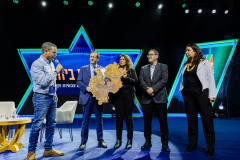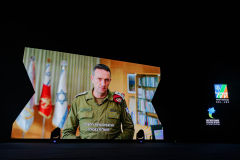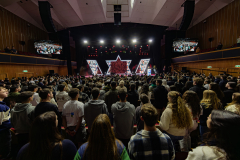How did you connect with Zikaron BaSalon?
While I was in the army, my elder brother (he also graduated from Meitzar) organized a Zikaron BaSalon event in his apartment. That was the first time I saw how it’s executed: in homes, with a small audience, among friends and guests, in an intimate atmosphere. I felt that observing Holocaust and Heroism Remembrance Day in that way was very powerful. My grandfather and grandmother and my close family didn’t go through the Holocaust, but I felt strongly about the idea of remembering—and that’s how it became central to my life.
When I did the Israel Trail, I saw on Facebook that Zikaron BaSalon was recruiting people, and I immediately understood that that was where I was headed. My job in the project, as Director of Partnerships, Organizations, and Accessibility, is to make the memory of the Holocaust more accessible and to put on sessions with witnesses and survivors in jails, at-risk youth institutions, hostels for individuals on the autism spectrum, and institutions for women who are getting out of the cycle of prostitution. Passover is defined by the commandment of “you shall tell your child” (Exodus 13:8), which is about preserving the memory of the exodus from Egypt down through the generations. We at Zikaron BaSalon want this project to be an integral part of Jewish tradition in a hundred years. We want people to talk about the Holocaust with their children. We want the encounter in the living room to turn into an Israeli tradition, since we’re planning for the day after—when the survivors won’t be with us anymore.
In two weeks, I’ll go to Neveh Tirtzah Prison, and I’m so excited that a witness is going to be telling her story to the prisoners. I hope that bare human memory will give them inspiration and a sense of proportion, and help them come face-to-face with themselves and ask important and relevant questions, such as: What kind of a person do I want to be? How should I conduct myself with someone who is different from me? and so on.
What would you say is the key effort that’s needed to preserve the memory of the Holocaust?
What we have on our plate today is that the responsibility is passing to us. We’re interested in actively soaking up the stories, the experiences, and the journey of all the survivors, both of the Holocaust of European Jewry and from North Africa. We work hard to extend memory by giving a place to the second generation, which grew up in the shadow of the trauma. In another few years we no longer will be able to rely only on encounters where firsthand testimony is given, so it’s important right now to create an awareness of extended memory. Living among us, there still are Holocaust survivors who haven’t ever told their story, and the living room is a wonderful space to share their experience in a way that is intimate, secure, connected to the audience, and homey. This way, we turn the audience into a significant part of the encounter. Instead of the passivity of ceremonies, every one of the participants can be personally involved through listening carefully and internalizing.
Can you tell us about an interesting interaction that you had with a survivor, or insights from your work?
During my second day on the project, we went to a meeting with Yesh, an association of Holocaust orphans. When we came in, we saw written on the wall in huge letters: “Remember what the Nazi oppressor did to you.” Suddenly I realized that these people I was meeting lived in this terrible reality. That combination, together with the backdrop of a group of survivors who want with all their souls to take action for the sake of commemoration, made me choke up so much that I managed to recover only the next day.
Later in my work, I saw the same thing in small, everyday meetings with survivors, such as a survivor who just wants to share and expresses appreciation for being given the stage. Sometimes it takes just a single word from them to understand the strength of spirit they needed to muster in order to talk with me at all. It’s an enormous mission for them, and we’re obliged to take it seriously.

Holocaust survivor Rachel Roth at a Zikaron BaSalon gathering, 2018. Credit: Shachar Peled
Was there an experience you had at mechina with the survivor population that spurred you to organize this project?
At mechina (Meitzar), we split up to do different volunteer activities across the Golan Heights and the vicinity, and I had friends in my class who volunteered through LeChaim with Holocaust survivors. They were always coming back with incomprehensible stories and talking about the special relationships they’d developed with the survivors. Even then the subject started to pique my interest, and I understood how significant it was from them.
I can say without reservation that many of the decisions I’ve made were influenced by the mechina experience, expressly or implicitly, both decisions that have to do with people and the friends around me, and more serious decisions that have to do with me: what meaning I want to give this life, where I need to give of myself, and where to find the challenge and the hard work.
I invite everybody to take an active part this year in Holocaust and Heroism Remembrance Day. We need to hear about the past, and in the meantime also learn and draw on it as we move toward the future, from a place of mourning to a place of repair. Take advantage of the fact that the stories are still here, still very much alive,
and create something together. After all, is it such a big deal to open up your living room one evening a year?”






















